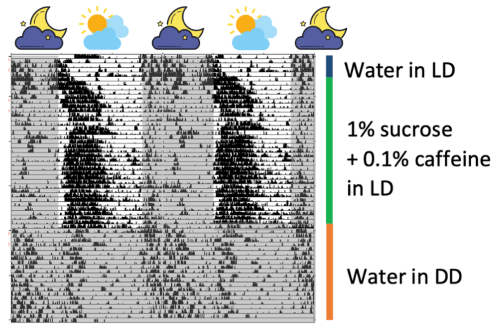Researchers have found that adding sugar or artificial sweetener to drinks with caffeine gives a significant boost to the sleep-wake period in mice

Sweetened caffeine-induced nocturnal behavior in mice
Mouse locomotor activity measured by an infrared sensor. Each drinking water condition was indicated in the right side. (Courtesy of Yu Tahara/Hiroshima University)
Adding sugar or artificial sweeteners to coffee disrupted the body clocks in mice more than coffee on its own, researchers have found, with it causing day and night to be reversed in some mice. If this holds for humans as well, adding sweetener to coffee would have significant health ramifications.
The findings were published in the journal npj Science of Food in August.
If you need to perk yourself up in the morning, or stay up late to get some work or a school assignment done, most people will make themselves a cup of coffee or grab an energy drink containing caffeine. These "night-owl" effects of that perky chemical are far from unknown. Myriad epidemiological studies have demonstrated how night-oriented people tend to drink more caffeinated beverages than morningness people, and experiments on animals and cells have shown how caffeine works to extend the waking period of the internal body clock.
But a group of researchers have accidentally discovered that changes in the activity rhythms of mice were affected even more strongly when they mixed caffeine with sugar or other sweeteners.
"We were examining the characteristics of male mice behavior during sweetened caffeine water drinking just in general, and came across interesting behavioral changes we hadn't expected," said Yu Tahara, associate professor in the Graduate School of Biomedical and Health Sciences at Hiroshima University. "So we targeted our investigations on these sugary effects."
The team gave sweetened caffeine water containing 0.1% caffeine, which is half the concentration of espresso and either 1% sucrose, which is one-tenth the concentration of most energy drinks, or 0.1% saccharine.
"The added sweetness did not change the amount of this caffeine water that the mice drank, so the effects could not be the result of just drinking more caffeine," added Tahara. "It had to be the combination of caffeine and sweetener."
The mice that had consumed the caffeine-sweetener mix experienced a very long "free-running" sleep-wake period of 26-30 hours, and some even switched from a nocturnal circadian rhythm to a daytime-based one.
These effects continued to happen even when the mice were subjected to persistent darkness. This latter phenomenon suggests that the caffeine-sweetener effect is operating independently of the central regulator of the internal body clock, the suprachiasmatic nucleus (SCN), which lies in the hypothalamus in the brain. That central regulator itself is normally governed by light and the natural day-night cycle, and it in turn ensures a synchronization of clocks situated in organ tissue elsewhere in the body.
The researchers believe that the combination of caffeine and sweetness may be creating a conflicting signal within the body possibly mediated by another famous chemical, dopamine. Both caffeine and sweeteners activate the reward system in the brain, leading to the release of dopamine. It is this double hit of dopamine that could be contributing to the emergence of the long-period activity rhythms.
The researchers now aim to investigate further the possible dopamine link and see whether the boost to caffeine produced by sweetener is replicated in humans. While this initial study only looked at the effects in mice, the findings may have important implications for our understanding of how sweetened caffeine affects human health.
Many health authorities recommend an upper limit to the amount of caffeine consumed per day or recommend reduced consumption in the evening or night, as excessive amounts are associated with decreased sleep quality and enhanced night-owl tendencies, which in turn has a range of negative physical and mental health effects. This research adds another layer to this advice, suggesting that adding sweeteners to caffeine may further exacerbate any negative effects.
On the other hand, the researchers are also keen to study the effects of caffeine and sweetener intake in the morning. "If you want to be even more perky in the morning, you might want to make sure you take your coffee with something sweet for breakfast," said Tahara.
About the study
Journal: npj Science of Food*
Title: Sweetened caffeine drinking revealed behavioral rhythm independent of the central circadian clock in male mice
Author: Yu Tahara, Jingwei Ding, Akito Ito & Shigenobu Shibata
DOI: 10.1038/s41538-024-00295-6
Journal Citation Indicator (JCI) Quartile: Q1






